Sitting in the dimly lit theater, the villain takes center stage. His sinister laugh fills the room, capturing my attention. I find myself leaning in, excited to see what comes next. Discover the thrill of the unexpected in every scene.
But it’s not just the actions of villains that enthrall us; it’s their words. Villain monologues have a unique power to captivate us, leaving us both terrified and intrigued. But why? What is it about these twisted soliloquies that draws us in?
Perhaps it’s the way they reveal the dark depths of the human psyche, or the tantalizing glimpse into a world we dare not explore ourselves.
In this exploration, we will uncover the secrets behind why villain monologues have such a hold on our imagination.

Key Takeaways
- Villain monologues have the power to evoke a range of emotions in viewers.
- Villain characters like The Joker, Hannibal Lecter, and Darth Vader challenge societal norms and our own morality.
- Villain monologues allow us to glimpse the humanity within these characters and question our own capacity for empathy.
- The cultural fascination with villains stems from our curiosity about the human psyche and attraction to what lies beyond normalcy.
The Joker – The Dark Knight
The Joker’s monologues in The Dark Knight captivate audiences with their chilling intensity and unpredictable nature. As a viewer, I couldn’t help but be drawn into the twisted mind of this iconic villain. The impact of the Joker’s monologues on viewers is undeniable. They’ve the power to evoke a range of emotions, from fear and unease to fascination and even admiration.
One of the reasons the Joker’s monologues have such a strong influence on the audience is because of the depth and complexity of his character. He’s not just a one-dimensional villain, but a psychologically disturbed individual with a twisted sense of humor and a penchant for chaos. This complexity allows the audience to see beyond the surface and delve into the dark recesses of the human psyche.
Another reason the Joker’s monologues captivate us is because of the way they challenge our moral compass. He poses thought-provoking questions about the nature of good and evil, forcing us to confront the darker side of our own humanity. By doing so, he holds up a mirror to society and exposes its flaws and contradictions.
Hannibal Lecter – The Silence of the Lambs
Discussing Hannibal Lecter in ‘The Silence of the Lambs,’ his manipulative conversations with Clarice Starling captivate audiences with their psychological tension and unsettling allure. Hannibal Lecter is undoubtedly one of the most captivating villains in cinematic history. As a complex character, he embodies the psychological allure of villains, drawing audiences into his twisted mind and manipulating their emotions.
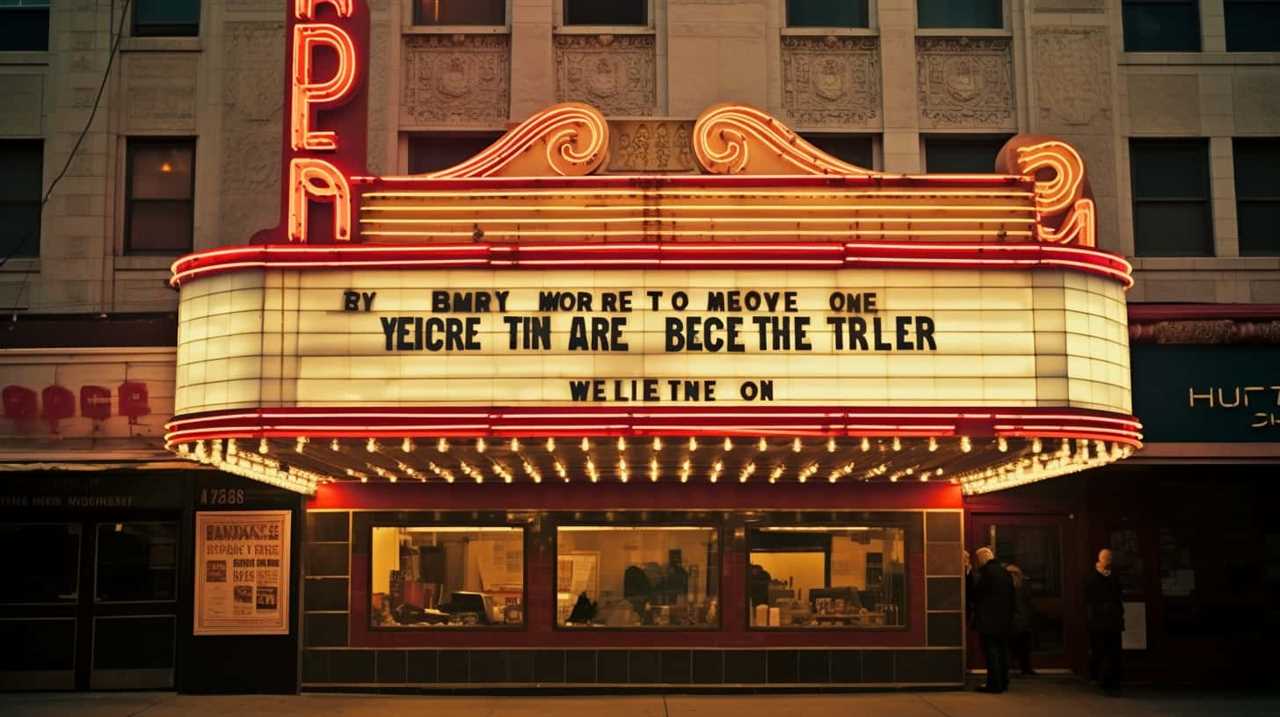
In ‘The Silence of the Lambs,’ Lecter’s monologues have a profound impact on both the characters within the film and the viewers watching. His power dynamics in these conversations are fascinating to observe, as he exerts control over Clarice Starling, using his intellect and psychological manipulation methods to unsettle her. The psychological impact of his monologues goes beyond the realm of entertainment, leaving a lasting impression on the audience.
Lecter’s allure lies in his ability to tap into the dark depths of human nature. Similar to other iconic villains such as Anton Chigurh from ‘No Country for Old Men,’ Norman Bates from ‘Psycho,’ and Hans Landa from ‘Inglourious Basterds,’ Lecter represents the embodiment of evil and the allure of darkness. These villains challenge societal norms and our own morality, forcing us to confront our own fears and desires.
The cultural fascination with villains stems from our innate curiosity about the human psyche and our attraction to what lies beyond the boundaries of normalcy. Characters like Lecter, Lord Voldemort from the ‘Harry Potter’ series, Gordon Gekko from ‘Wall Street,’ Alex DeLarge from ‘A Clockwork Orange,’ Keyser Söze from ‘The Usual Suspects,’ Tyler Durden from ‘Fight Club,’ Patrick Bateman from ‘American Psycho,’ and Agent Smith from ‘The Matrix’ all captivate us with their psychological allure and the impact of their monologues.
Darth Vader – Star Wars
As a fan of Star Wars, I can’t help but be captivated by Darth Vader’s iconic villainous presence. One of the reasons for this allure is the psychological complexity that lies beneath his mask, making him a fascinating character to analyze.
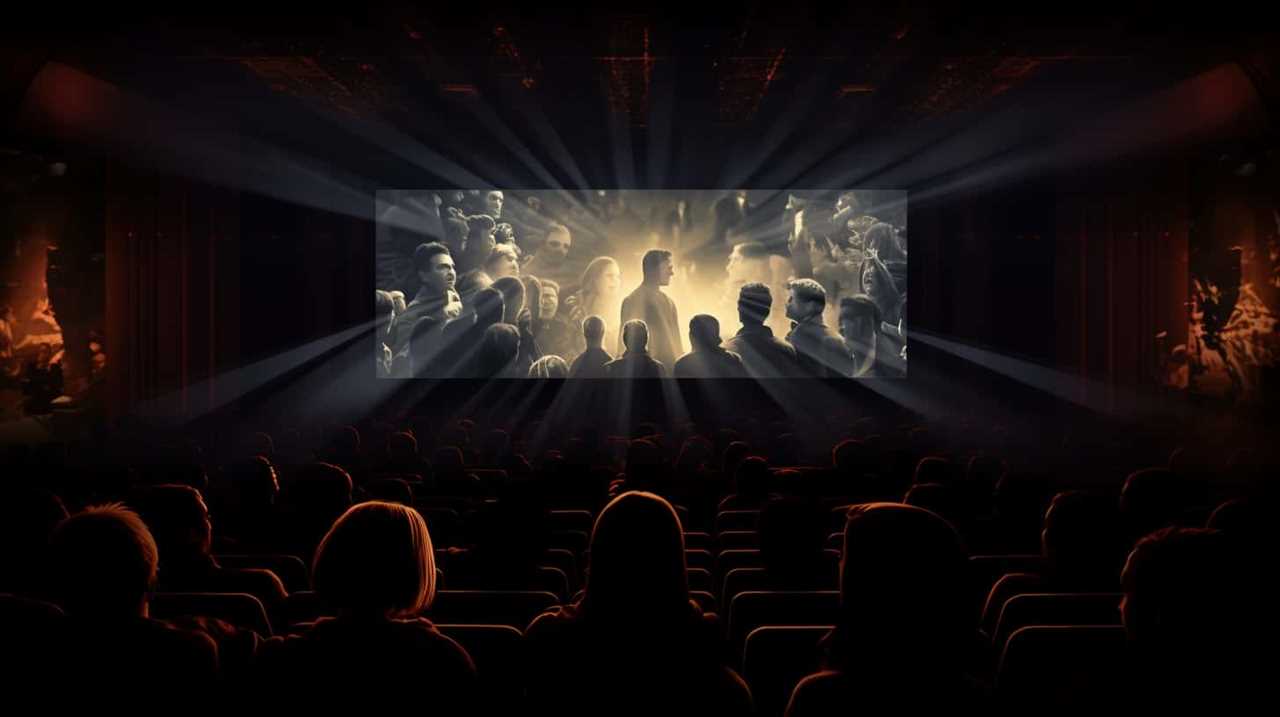
Additionally, his monologues, such as the famous ‘I am your father,’ have a profound impact on the audience, adding depth and emotion to his character.
Psychological Allure of Villains
The psychological allure of villains, such as Darth Vader from Star Wars, is captivating and intriguing. Here are four reasons why these villains hold such a fascination for us:
- Villain redemption arcs: The possibility of a villain turning away from darkness and finding redemption appeals to our innate desire for second chances and the potential for change.
- Emotional complexity: Villains often possess a depth of emotion and complexity that challenges our understanding of good and evil. This complexity draws us in and makes us question our own moral boundaries.
- The role of empathy: Villain monologues allow us to glimpse the humanity within these characters, making us question our own capacity for empathy. We find ourselves empathizing with their struggles, even if we don’t agree with their actions.
- Exploration of the darker side of human nature: Villains serve as a mirror, reflecting the darker aspects of our own psyche. By exploring these darker impulses through fictional characters, we can better understand and navigate our own complexities.
The psychological allure of villains lies in their ability to challenge our perceptions, evoke empathy, and shed light on the intricacies of human nature.
Impact of Iconic Monologues
One reason Darth Vader’s iconic monologues captivate us is their ability to convey a sense of power and menace. As one of the most iconic villains in cinematic history, Darth Vader represents a misunderstood character whose monologues reveal the depth of his fear-driven motives.

The role of fear in villain monologues is crucial, as it allows us to glimpse the vulnerabilities and insecurities behind their actions. The way Vader confidently delivers his speeches, with his deep and commanding voice, creates a chilling effect that resonates with audiences. His monologues not only establish his authority but also evoke a sense of fear and anticipation.
Through these monologues, we’re drawn into Vader’s world, compelled to understand the complexities of his character, and ultimately captivated by his undeniable presence.
Villains as Complex Characters
Darth Vader’s complexity as a character in Star Wars makes him a fascinating villain. His motivations aren’t simply driven by a desire for power or destruction, but are shaped by a complex web of emotions and experiences. Here are four reasons why Vader’s complexity stands out:
- Tragic backstory: Anakin Skywalker’s fall from grace and transformation into Darth Vader is a testament to the impact of moral ambiguity in villains. His inner conflict between good and evil adds depth to his character.
- Struggle with identity: Vader’s struggle to reconcile his past as a Jedi Knight with his present as a Sith Lord showcases the complexity of his character. This internal battle makes him relatable, despite his villainous actions.
- Redemption arc: The potential for redemption is a powerful theme in Vader’s character arc. His eventual sacrifice to save his son, Luke Skywalker, adds another layer of complexity to his motivations.
- Moral ambiguity: Vader’s actions aren’t easily categorized as purely good or evil. This moral ambiguity challenges traditional notions of villainy and adds intrigue to his character.
Anton Chigurh – No Country for Old Men
Anton Chigurh’s chilling presence and ruthless actions in ‘No Country for Old Men’ captivate audiences with his menacing portrayal of a sociopathic killer. His character leaves a profound psychological impact on the audience, making them question the depths of human darkness and the fragility of morality. Chigurh’s ability to instill fear and create tension is masterfully executed by Javier Bardem, who brings an intensity to the role that’s both disturbing and mesmerizing.

Chigurh’s influence on pop culture can’t be understated. His iconic hairstyle, calm demeanor, and twisted moral code have become synonymous with the archetype of a cold-blooded assassin. His coin toss scene, where he gives his victims a chance to determine their fate, has become one of the most memorable moments in cinematic history.
As we delve into the psyche of Anton Chigurh, we’re left with a sense of unease and fascination. His character challenges our understanding of good and evil, blurring the lines between hero and villain. It’s this complexity that makes Chigurh such a compelling character, and one that continues to captivate audiences to this day.
Transitioning into the subsequent section about Norman Bates in ‘Psycho’, we encounter another iconic villain whose psychological impact and influence on pop culture are equally significant.
Norman Bates – Psycho
When it comes to villain monologues, Norman Bates from ‘Psycho’ stands out as a prime example. The psychological impact of his monologues is undeniable, as they give us a glimpse into the twisted mind of a killer.

As an audience, we’re both fascinated and repelled by Norman’s character, drawn to the power dynamics at play in his speeches.
Psychological Impact of Monologues
As I watched Norman Bates deliver his chilling monologue in Psycho, I couldn’t help but be captivated by the profound psychological impact it had on me. The impact of monologues in storytelling and the role they play in character development became strikingly clear. Here’s why:
- Deepening the character: Through his monologue, Norman Bates reveals his twisted mindset, exposing his inner thoughts and motivations. This allows us to gain a deeper understanding of his disturbed psyche.
- Creating suspense: The intensity of Norman’s monologue builds suspense as we anticipate his next move. We’re held captive by the psychological tension, unsure of what he might do next.
- Establishing empathy: Despite Norman’s villainous actions, his monologue humanizes him, evoking empathy and making us question the boundaries between good and evil. We’re forced to confront the complexity of human nature.
- Leaving a lasting impression: The psychological impact of Norman’s monologue lingers in our minds, haunting us long after the movie ends. It challenges our perceptions and leaves us questioning our own sanity.
Audience Fascination With Villains
I’m captivated by the way villains like Norman Bates from Psycho can mesmerize an audience. There’s something intriguing about their complex personalities and the moral ambiguity they bring to the story.
One reason why we find villains fascinating is their potential for redemption. We’re drawn to the idea that even the most evil characters can find a way to change and seek redemption. It challenges our beliefs about good and evil, forcing us to question the nature of humanity and the choices we make.

Norman Bates, for example, is a character who elicits both fear and sympathy. His transformation from a troubled individual to a remorseful one showcases the complexity of human nature. It’s this moral ambiguity that keeps us engaged and captivated by villains like Norman Bates, constantly questioning our own perceptions of right and wrong.
Power Dynamics in Monologues
The power dynamics in villain monologues, such as those delivered by Norman Bates in Psycho, reveal the intricacies of manipulation and control. These monologues aren’t merely a display of evil intent, but a calculated use of language to assert dominance and influence over the listener. Here are four ways in which power dynamics are showcased in Norman Bates’ monologues:
- Language manipulation: Norman Bates skillfully uses language to manipulate the perception of reality, blurring the lines between truth and fiction.
- Psychological dominance: Through his monologues, Bates exerts psychological power over his victims, instilling fear and confusion.
- Power play: Bates strategically uses his words to establish control and dominance, making his victims feel helpless and subordinate.
- Subtle intimidation: Bates employs subtle threats and innuendos in his monologues, creating an atmosphere of tension and unease.
Understanding these power dynamics in monologues sets the stage for exploring the captivating monologues of Hans Landa in Inglourious Basterds.
Hans Landa – Inglourious Basterds
One of the most chilling villain monologues in film is delivered by Hans Landa in Inglourious Basterds. Played masterfully by Christoph Waltz, Landa’s character captivates audiences with his psychological impact and cultural fascination as a villain.

Landa’s monologues have a profound psychological impact on viewers. His eloquence and charm, coupled with his sadistic nature, create a disturbing mix that both repels and enthralls. The way he effortlessly switches between languages and manipulates those around him adds to his allure as a complex and unpredictable antagonist. Landa’s monologues force us to confront the darkest parts of human nature, leaving us uneasy yet unable to look away.
The cultural fascination with Landa as a villain isn’t surprising. He embodies the archetype of the charming but ruthless villain, a character that has fascinated audiences for centuries. Landa’s intelligence, wit, and meticulous attention to detail make him a formidable adversary, and his monologues reveal the depths of his villainy. Through his character, we’re reminded of the potential for evil that exists within humanity, and the thin line that separates civility from barbarity.
Nurse Ratched – One Flew Over the Cuckoo’s Nest
Continuing the exploration of captivating villain monologues, Nurse Ratched from One Flew Over the Cuckoo’s Nest frequently mesmerizes audiences with her chilling control and calculated manipulation. Here’s why her portrayal of power and manipulation techniques are so captivating:
- Cold and calculated demeanor: Nurse Ratched exudes an aura of icy control, never revealing her true emotions. This unwavering composure makes her all the more terrifying, as she pulls the strings behind the scenes.
- Psychological manipulation: Ratched’s manipulation techniques are subtle yet devastating. She employs gaslighting and emotional manipulation to maintain her power over the patients, exploiting their vulnerabilities and insecurities.
- Symbol of authority: Ratched represents the oppressive system that the patients are trapped in. Her white uniform and authoritative presence reinforce her position of power, making her every action feel like a calculated move in a chess game.
- Battle of wills: Ratched’s interactions with the rebellious Randle McMurphy create a captivating dynamic. Their constant power struggle keeps audiences on the edge of their seats, wondering who’ll come out on top.
Nurse Ratched’s portrayal of power and manipulation techniques not only captivates us, but also forces us to question the abuse of authority in our own lives.
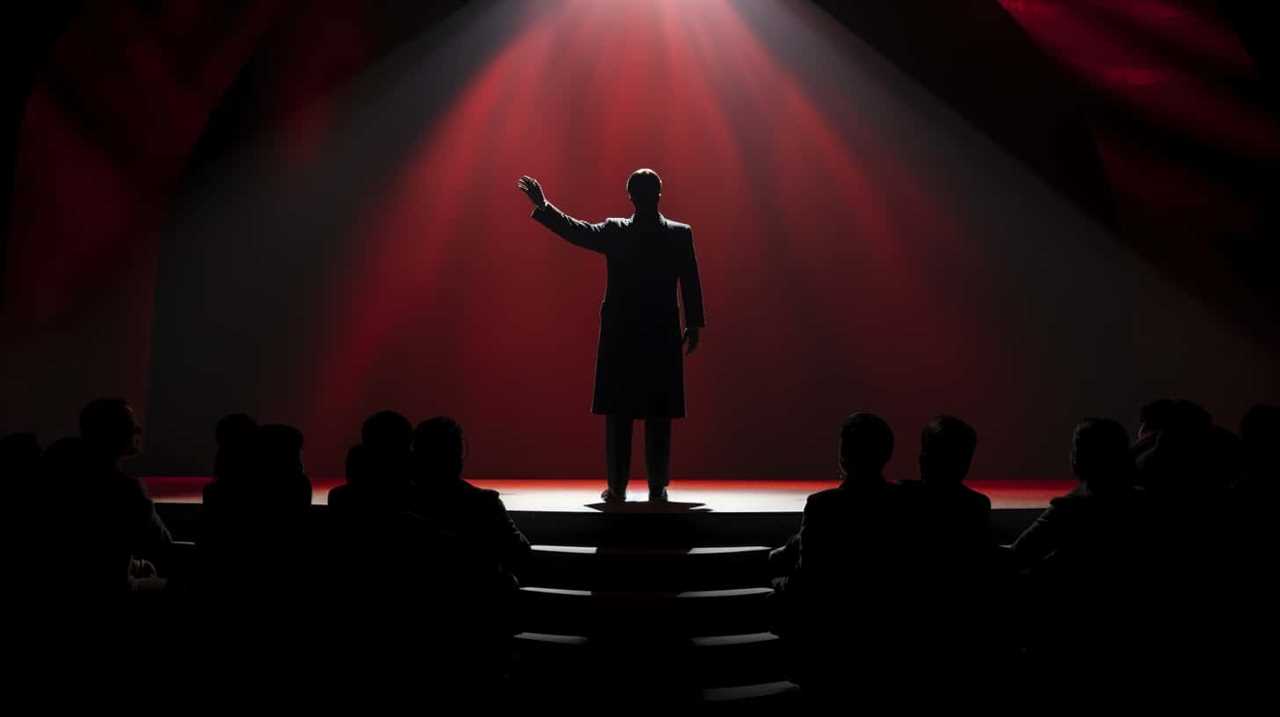
Now, let’s delve into the next villain: Lord Voldemort from the Harry Potter series.
Lord Voldemort – Harry Potter Series
Lord Voldemort’s reign of terror in the Harry Potter series is fueled by his quest for immortality and ultimate power. Born as Tom Riddle, his transformation into Lord Voldemort showcases the origins of his darkness and the evolution of his character throughout the series. One of the most captivating aspects of Lord Voldemort is his ability to deliver mesmerizing monologues that leave a lasting impact on the audience. His words possess a psychological allure, drawing us into his villainy and making us question our own morality.
In his monologues, Lord Voldemort exerts a power dynamic that’s both fascinating and terrifying. He manipulates and intimidates his followers, using his words to reinforce his dominance and control. This dynamic creates a sense of unease, yet we can’t help but be enthralled by his presence.
Lord Voldemort’s cultural fascination stems from the complexity of his motives and actions. His desire for power and immortality mirrors the ambitions of other iconic villains, such as Darth Vader and Sauron. We’re drawn to his character because he represents the darker aspects of human nature, forcing us to confront our own fears and desires.

Transition: As we delve deeper into the allure of villain monologues, it’s essential to explore the cunning and captivating Gordon Gekko from ‘Wall Street’.
Gordon Gekko – Wall Street
Gordon Gekko, the cunning and captivating antagonist in ‘Wall Street’, embodies the allure of villain monologues with his ruthless pursuit of wealth and power. His character’s influence on the power dynamics and cultural landscape of the film is undeniable.
Here are four key elements that make Gordon Gekko’s monologues so captivating:
- Charismatic Presence: Gordon Gekko’s magnetic personality draws us in, making it hard to look away. His confidence and charisma command attention, leaving us eager to hear what he’s to say.
- Unapologetic Greed: Gekko’s unrelenting pursuit of wealth and power challenges societal norms and pushes boundaries. His audacious monologues challenge our own values, forcing us to confront the darker side of human ambition.
- Provocative Philosophy: Gekko’s monologues are filled with memorable lines that have become iconic in popular culture. His ruthless business tactics and the provocative ideologies he espouses resonate with audiences, sparking heated debates about the nature of capitalism and morality.
- Mirror to Society: Gekko’s character represents the embodiment of corporate greed that was prevalent during the 1980s. His monologues shed light on the power dynamics at play in the corporate world and serve as a cautionary tale about the dangers of unchecked ambition.
Gordon Gekko’s villainous monologues captivate us because they tap into our fascination with power dynamics and cultural influence. They challenge our beliefs and force us to question our own values, making him an enduring and compelling character in the realm of villain monologues.

Alex DeLarge – A Clockwork Orange
When it comes to captivating villain monologues, one character that stands out is Alex DeLarge from A Clockwork Orange. What makes Alex so intriguing is his psychological manipulation methods, which he uses to control and manipulate those around him.
His ability to delve into the darkest corners of the human psyche and exploit people’s vulnerabilities is both disturbing and captivating. It’s this allure of darkness that draws us in and makes us unable to look away from his twisted and complex character.
Alex’s Psychological Manipulation Methods
As I delve into the captivating world of villain monologues, one particular character’s psychological manipulation methods stand out – Alex DeLarge from A Clockwork Orange. His mesmerizing monologues not only captivate the audience but also leave a profound impact on our understanding of manipulation.
- Distinctive Language: Alex’s use of a unique vocabulary, filled with slang and invented words, creates an aura of mystery and intrigue, drawing the audience in.
- Charismatic Persona: Through his charm and charisma, Alex manipulates his listeners, making them question their own moral compass and empathize with his twisted worldview.
- Emotional Manipulation: Alex masterfully plays with his audience’s emotions, evoking pity, fear, and even admiration, as he narrates his heinous acts with an unapologetic and detached demeanor.
- Breaking the Fourth Wall: By directly addressing the audience, Alex blurs the line between fiction and reality, making us accomplices in his sinister deeds and forcing us to confront our own complicity.
Alex’s manipulation techniques and the impact of his monologues on the audience make him a truly captivating and unforgettable villain.
The Allure of Darkness
One cannot help but be drawn to the allure of darkness embodied by Alex DeLarge in A Clockwork Orange. His seductive appeal lies in his exploration of evil, as he revels in the chaotic and violent world he creates. Alex’s character is both fascinating and repulsive, as he embodies the dark side of humanity with a charismatic charm that is impossible to resist. Through his actions, he challenges societal norms and forces us to question our own moral compass. In A Clockwork Orange, the dichotomy between good and evil is blurred, leaving us captivated by the complex nature of Alex’s character. It is this exploration of evil that keeps us enthralled, as we grapple with our own fascination with the darker aspects of human nature.
| The Allure of Darkness (Alex DeLarge – A Clockwork Orange) |
|---|
| Seductive appeal |
| Exploration of evil |
Keyser Söze – The Usual Suspects
In my opinion, without a doubt, the enigmatic character of Keyser Söze from the film ‘The Usual Suspects’ is a perfect embodiment of cunning and manipulation. Keyser Söze captivates audiences with his power dynamics in monologues, showcasing a cultural fascination with villains.
Here are four reasons why Keyser Söze stands out as a captivating character:
- Unpredictability: Keyser Söze’s ability to constantly surprise and deceive both his allies and adversaries keeps viewers on the edge of their seats. His unpredictable nature adds a layer of mystery and excitement to his monologues, making them all the more captivating.
- Charisma: Despite being a ruthless criminal mastermind, Keyser Söze possesses an undeniable charisma. His persuasive and commanding presence draws audiences in, making them hang onto his every word during his monologues.
- Intelligence: Keyser Söze’s intellect is unparalleled. He strategically plans his every move, manipulating those around him to serve his own agenda. His intelligent and calculated monologues showcase his superior mental prowess, leaving viewers in awe of his capabilities.
- Moral ambiguity: Keyser Söze exists in a gray area between good and evil. This moral ambiguity adds depth to his character and allows audiences to question their own moral compass. His monologues challenge societal norms and force viewers to consider the complex nature of morality.
Keyser Söze’s character in ‘The Usual Suspects’ is a prime example of the captivating power dynamics in monologues and our cultural fascination with villains. His cunning, charisma, intelligence, and moral ambiguity make him a character that continues to intrigue and captivate audiences.

Tyler Durden – Fight Club
Continuing the exploration of captivating villain monologues, let’s delve into the enigmatic character of Tyler Durden from the film ‘Fight Club’. Tyler Durden, played by Brad Pitt, has become an iconic figure known for his charismatic manipulation of power dynamics. In ‘Fight Club’, Tyler Durden represents the allure of darkness, drawing us in with his rebellious nature and unconventional philosophies.
| Tyler Durden Quotes | Emotional Response |
|---|---|
| "It’s only after we’ve lost everything that we’re free to do anything." | Liberation and freedom from societal constraints |
| "I want you to hit me as hard as you can." | A thrilling and exhilarating challenge |
| "This is your life, and it’s ending one minute at a time." | A wake-up call to seize the present moment |
Tyler Durden’s monologues tap into our deepest desires and fears. He challenges the status quo, urging us to question the meaning of our existence and break free from the constraints of society. His words evoke a sense of liberation, inviting us to explore our own darkness and embrace our primal instincts.
Fight Club serves as a metaphor for the internal struggle we all face, the battle between conformity and rebellion. Tyler Durden embodies the darker aspects of humanity that we often suppress, captivating us with his unapologetic audacity.
Patrick Bateman – American Psycho
When it comes to captivating villain monologues, one can’t ignore the chilling performance of Patrick Bateman in American Psycho.
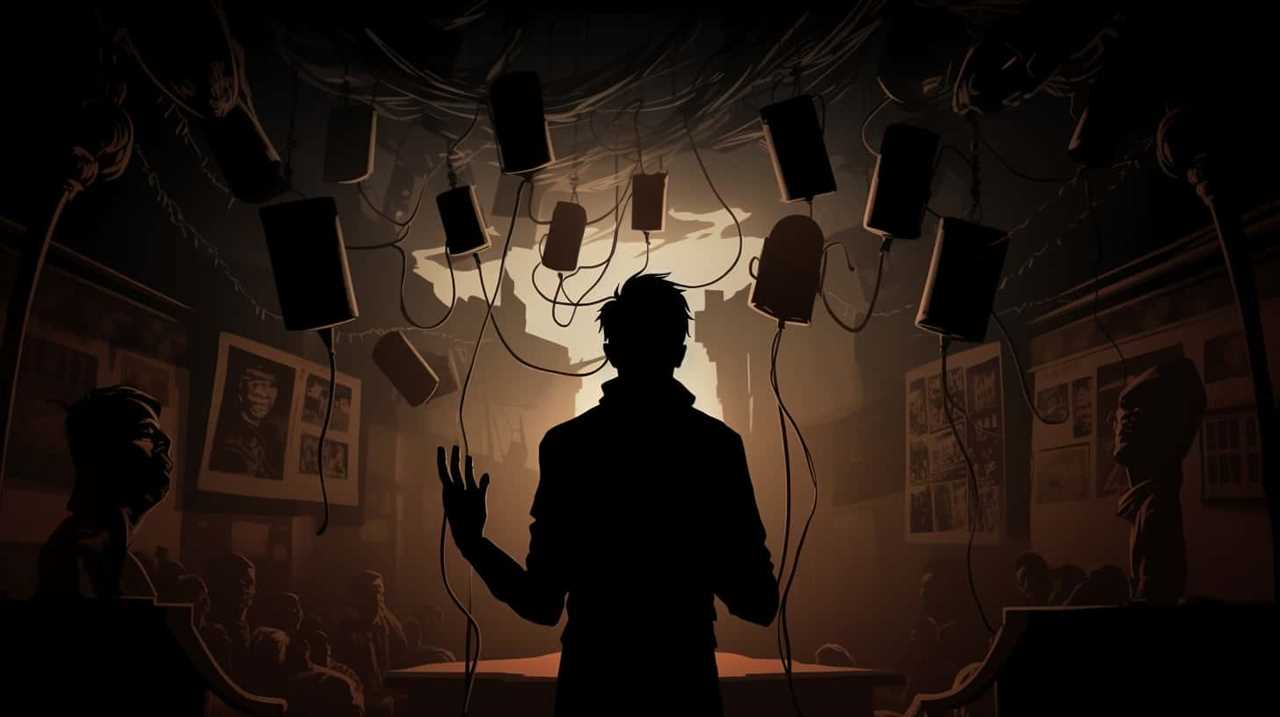
The psychological allure of his monologues lies in the way they give us a glimpse into the twisted mind of a sociopathic killer.
Bateman’s character taps into our cultural fascination with villains, forcing us to confront the darkness that lurks within us all.
Psychological Allure of Monologues
As I delve into the psychological allure of monologues, particularly that of Patrick Bateman in American Psycho, it becomes evident that their captivating nature stems from the subliminal manipulation of the audience’s emotions. Monologues have a profound psychological effect on us, tapping into our deepest fears, desires, and curiosities.
Here are four ways in which monologues like the one performed by Patrick Bateman captivate us:
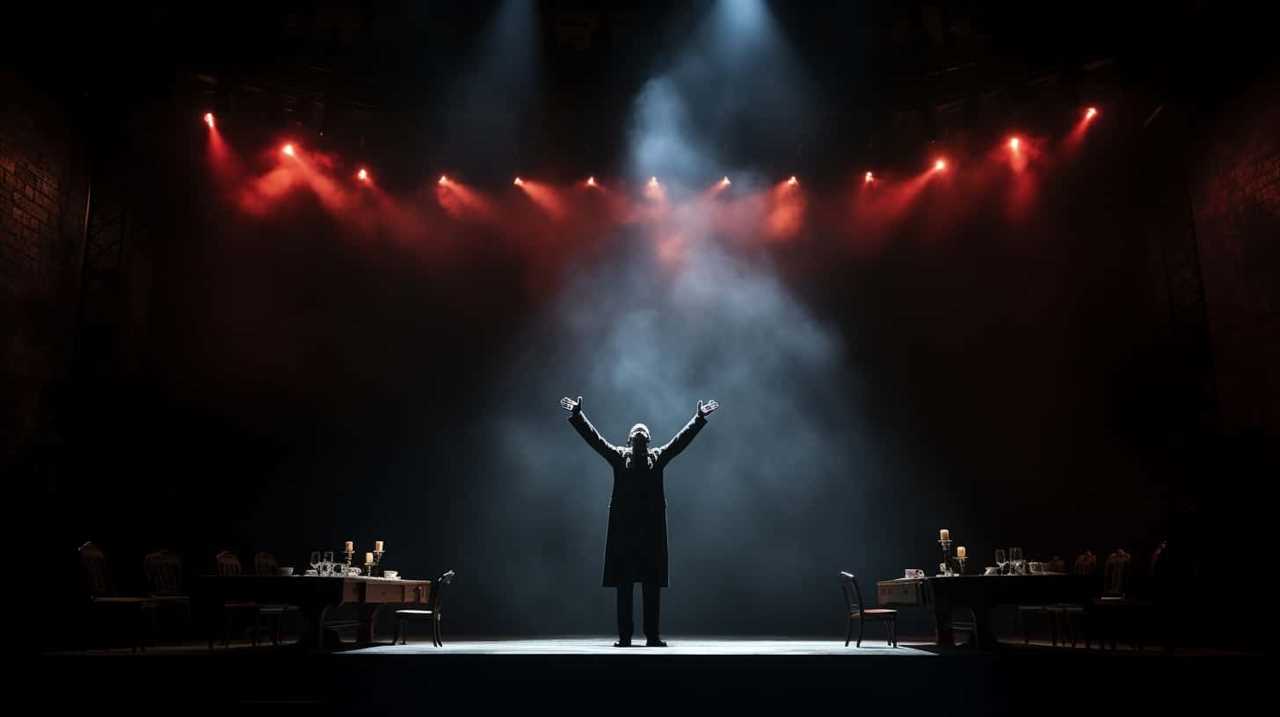
- Intrigue: Monologues create a sense of mystery, leaving us yearning for more information and insight into the character’s psyche.
- Empathy: Through monologues, we develop a connection with the character, allowing us to experience their emotions and thoughts firsthand.
- Intensity: Monologues often contain an intense emotional climax, drawing us in and keeping us engaged throughout.
- Power dynamics: Monologues provide a platform for characters to assert their dominance, leaving us in awe of their confidence and charisma.
Monologues, particularly those delivered by villains like Patrick Bateman, have a profound impact on our perception and emotional state.
Cultural Fascination With Villains
One reason for our captivation with villain monologues, specifically Patrick Bateman in American Psycho, is the cultural fascination with these antagonistic characters. Villains like Bateman have had a profound cultural impact, representing a darker side of humanity that both repels and intrigues us. They challenge societal norms and push the boundaries of morality, forcing us to confront our own fears and desires.
In American Psycho, Bateman’s monologues give us a glimpse into the mind of a deranged serial killer, allowing us to explore the depths of human depravity. This cultural fascination with villains is evident in the media we consume, as we continue to be drawn to complex and morally ambiguous characters.
Now, let’s transition to another iconic villain, Agent Smith from The Matrix, and explore the psychological allure of his monologues.

Agent Smith – The Matrix
Discussing Agent Smith from The Matrix, I find his villain monologues captivating due to their intense delivery and thought-provoking content. Here are four reasons why Agent Smith’s monologues have such a powerful psychological impact:
- Intense Delivery: Agent Smith’s monologues are delivered with an unwavering intensity that demands attention. His calm yet menacing tone draws us in and keeps us on the edge of our seats.
- Provocative Ideas: Smith’s monologues delve into profound philosophical concepts, challenging our understanding of reality, free will, and the nature of humanity. His words force us to question our own existence and the world around us.
- Compelling Language: The eloquence and precision of Smith’s monologues make his ideas even more compelling. His choice of words and powerful rhetoric create a captivating experience that lingers in our minds long after the movie ends.
- Character Development: Through his monologues, Agent Smith reveals his complex and multifaceted nature. We get glimpses of his motivations, desires, and disdain for humanity. These insights into his character deepen our understanding of him as a villain and make him all the more intriguing.
Agent Smith’s monologues in The Matrix not only serve to advance the plot but also leave a lasting impact on the audience. They engage us intellectually, emotionally, and philosophically, making us reflect on the deeper meaning of the story and our own existence.
Frequently Asked Questions
What Is the Backstory of the Joker in the Dark Knight?
The Joker’s origins in The Dark Knight are shrouded in mystery, adding to his captivating allure. Batman’s connection to the Joker brings a depth of darkness and complexity to their dynamic, making their scenes together utterly compelling.
How Does Hannibal Lecter Manipulate People in the Silence of the Lambs?
Hannibal Lecter’s manipulation techniques in "The Silence of the Lambs" are chillingly effective. Through his keen understanding of psychology, he leverages his knowledge to manipulate people, leaving a lasting psychological impact.
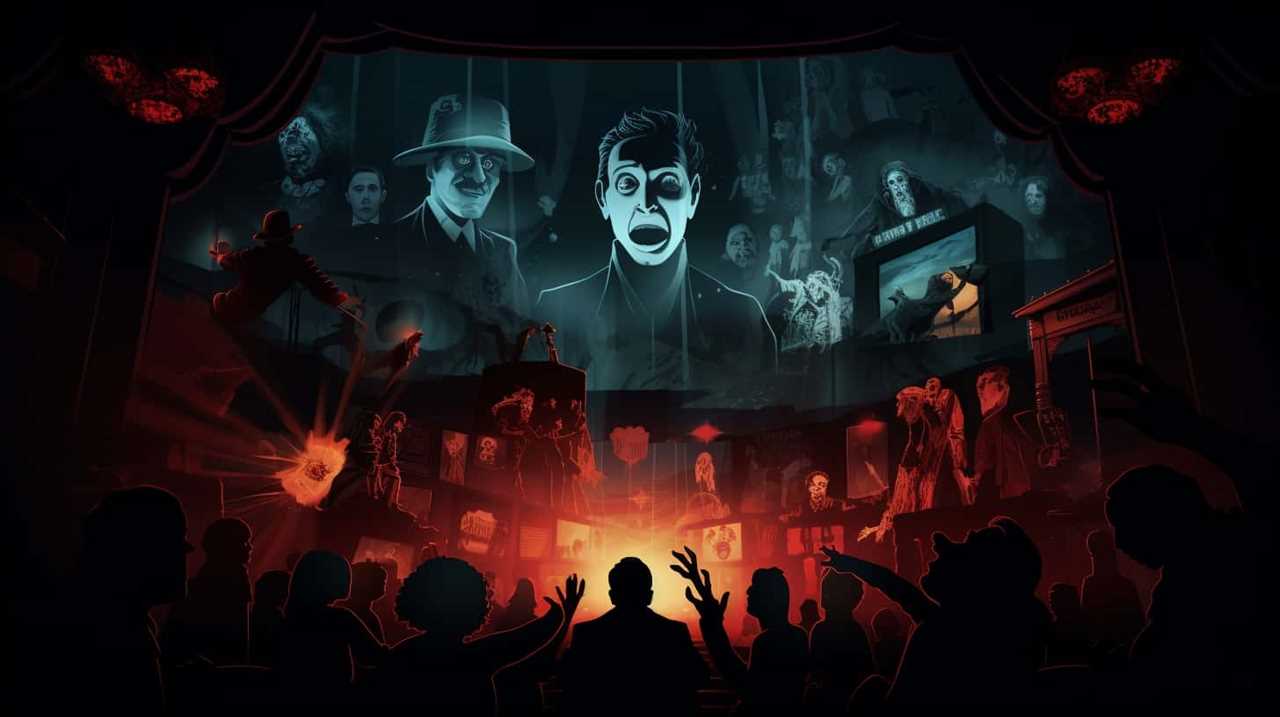
What Is the Motivation Behind Darth Vader’s Actions in Star Wars?
Darth Vader’s actions in Star Wars are driven by a dark motivation, a symphony of power and fear. He seeks to impose his will upon the galaxy, leaving a trail of destruction in his wake.
How Does Anton Chigurh Maintain His Calmness in No Country for Old Men?
Anton Chigurh’s stoic demeanor in "No Country for Old Men" is captivating. His calmness is maintained through psychological tactics. Villains like him intrigue us because they challenge our expectations and force us to question our own morality.
What Is the Psychological Profile of Norman Bates in Psycho?
What creates the psychological allure of characters like Norman Bates in Psycho? Through an in-depth analysis of their character development, we can uncover the intricate layers that captivate our fascination with these villains.
What Makes Villain Monologues and Action Movie One-Liners So Memorable and Captivating?
Villain monologues and best action movie oneliners are so memorable and captivating because they often convey the essence of the character in a few powerful words. Whether it’s a menacing threat or a witty quip, these lines stick with us long after the movie is over, adding depth to the story and creating an iconic moment.
Conclusion
Villain monologues have an undeniable power to captivate us, drawing us into the twisted minds of these characters. This goes to show that villain monologues have the ability to leave an indelible mark on our minds, forever etching themselves into the annals of pop culture.

One interesting statistic that highlights this fascination is the fact that the most memorable villain monologue in film history belongs to Heath Ledger’s Joker in ‘The Dark Knight.’ According to a survey, 86% of viewers could recall and quote his chilling line, ‘Why so serious?’









